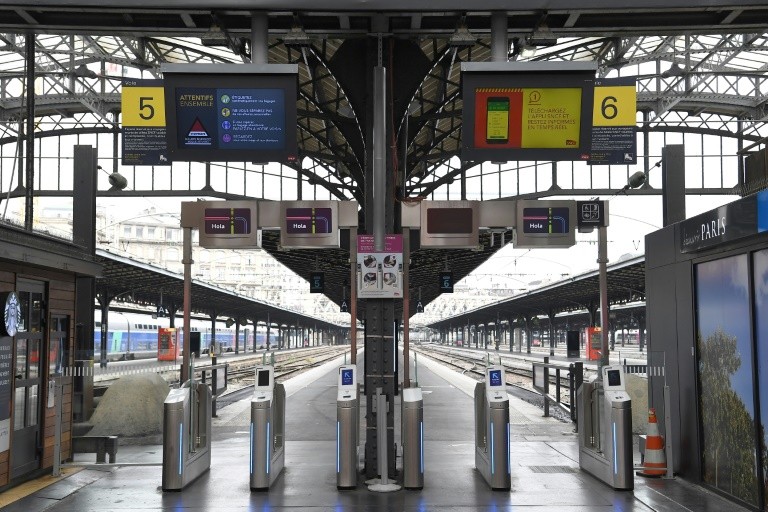Strike at SNCF: Back to Normal on Thursday, Traffic Forecasts

This Thursday 5th April, traffic must return to normal at the SNCF at the end of the first episode of strike action. 3 TER out of 4 and 3 Intercités out of 5 are planned.
3 TER out of 4 and 3 Intercity out of 5
On the second day of the first episode of a strike two days out of five announced until June 28, at the call of the CGT, Unsa and the CFDT, the overall stake was announced down by the management of the SNCF, with 29.7% of strikers “in the middle of the morning” (after 33.9% yesterday). But three quarters of drivers remained mobilized (74% against 77% Tuesday) and there were more controllers (77% against 69%) and switchers (46% against 39%) on strike.
As a result, only one TGV in seven and one regional train in five on average, substantially the same as Tuesday, were to circulate Wednesday.
Traffic should return gradually to normal Thursday, according to the SNCF. TGV traffic is announced “almost normal”, three out of four regional trains are planned and three intercity out of five.
Strike resumes on Saturday
The strike must resume from Saturday from 8pm for two days again, until Tuesday morning at 7.55am. In general assemblies (GA) on Wednesday, the railway workers of SUD-Rail, the only union that called for an indefinite strike renewable by 24 hours, have indeed decided not to engage in the immediate, “not to break union unity “.
But “SUD-Rail will propose the vote Monday in AG motions for a hardening of the movement given the urgency of the parliamentary calendar” warned Erik Meyer, spokesman for the union.
“I am convinced that we have the public opinion for us and the users who support us,” CGT-Cheminots Secretary General Laurent Brun told CNews.

Round table at the ministry
The government will lead the “transformation” of SNCF “to the end, calmly and with great determination,” despite the strike, said his spokesman Benjamin Griveaux, after the Council of Ministers.
President Emmanuel Macron asked ministers to “continue to calmly and calmly explain” this reform and “never stigmatize anyone,” he added.
The dialogue “is not broken,” promised SNCF boss Guillaume Pepy in an interview to regional dailies Ebra Group to appear Thursday, recalling the opening next week “consultations on the organization of work, the professions, today and tomorrow, the expansion of skills, better recognition of work.
The CGT, which last month published its own report on the future of rail, accuses the government and SNCF management of “smokiness” and “misinformation”.
CGT, Unsa, SUD and CFDT postponed their joint meeting scheduled for Thursday morning. They will meet Thursday afternoon at the Ministry of Transport for a round table on the debt, financing and status of the company SNCF. On Friday, another meeting at the ministry will focus on the social rights of railway workers.
The bill on the railway pact, which provides for the use of orders on certain points, will be voted on first reading on 17 April in the Assembly. MPs Republicans should agree to vote “for” the reform or “abstain,” said Damien Abad, one of the party’s vice presidents.

“General interest “
In Marseille, several hundred demonstrators – public finance agents, retired dockers, postal workers, students … – gathered Wednesday at midday at the Saint-Charles train station to support railway workers and “defend the public service”.
In the early morning, at the Lyon-Perrache station, Véronique, a 54-year-old home help, was coming off a train earlier than usual. “For my employer, the strike is not his problem. You have to be on time, “she said. “I did not really get to the bottom of the strike, but they have to stop. ”
“I understand the reasons for the strike,” said 39-year-old Dijon Emilie Hoertel, lawyer clerk in Paris. “Even if it does not suit us life, to keep a public service that mesh the territory, it’s worth fighting. ”
For the former number one CGT, Bernard Thibault, the government is mistaken target by wanting to change the status of the SNCF (in public limited company), abandon the hiring to the status of railway worker and open the rail passenger transport to the competition.
“To accuse the railwaymen of being responsible for the disaster of public policies is a shame”, whereas on the contrary their mobilization “carries the general interest”, affirms it in a tribune published in the World.
In terms of financial support for the strikers, the “kitty” launched on the 23rd March by thirty writers, directors or academics contained 220,000 euros, Wednesday early evening. As for the “strike fund” launched by SUD-Rail, it had close to 20,000 euros.

Enjoyed this? Get the week’s top France stories
One email every Sunday. Unsubscribe anytime.


